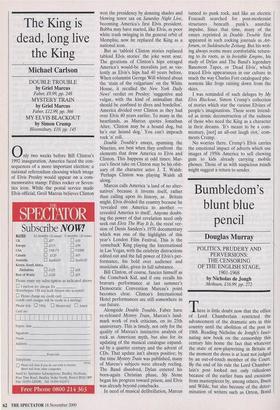The King is dead, long live the King
Michael Carlson
nly two weeks before Bill Clinton's 1992 inauguration, America faced the con- sequences of a more important election: a national referendum choosing which image of Elvis Presley would appear on a com- memorative stamp: Fifties rocker or Seven- ties icon. While the postal service made Elvis official, Greil Marcus believes Clinton won the presidency by donning shades and blowing tenor sax on Saturday Night Live, becoming America's first Elvis president. Bubba may have started, like Elvis, as poor white trash swinging in the general orbit of Memphis; now he replaced the King as a national icon.
But as 'tabloid Clinton stories replaced tabloid Elvis stories' the joke went sour. The gyrations of Clinton's hips enraged America's would-be moralists just as vio- lently as Elvis's hips had 40 years before. When columnist George Will whined about the 'stain of the vulgarians' on the White House, it recalled the New York Daily News' verdict on Presley: 'suggestive and vulgar, with the kind of animalism that should be confined to dives and bordellos'. America divided over Clinton as they had over Elvis 40 years earlier. To many in the heartlands, as Marcus quotes Jonathan Alter, 'Clinton may be a hound dog, but he's our hound dog.' You can't impeach rock 'n' roll.
Double Trouble's essays, spanning the Nineties, are best when they confront the elements that draw America to Elvis and Clinton. This happens at odd times: Mar- cus's finest take on Clinton may be his obit- uary of the character actor J. T. Walsh: `Perhaps Clinton was playing Walsh all along.'
Marcus calls America 'a land of no alter- natives' because it invents itself, rather than calling upon its history, as Britain might. Elvis divided the country because he `revealed one America to another revealed America to itself. Anyone doubt- ing the power of that revelation need only seek out Elvis The Way It Is, the recut ver- sion of Denis Sanders's 1970 documentary which was one of the highlights of this year's London Film Festival. This is the `comeback' King playing the International in Las Vegas, with the celebrity distractions edited out and the full power of Elvis's per- formance, his hold over audience and musicians alike, given its full substance.
Bill Clinton, of course, fancies himself as the Comeback Kid, and if one recalls his bravura performance at last summer's Democratic Convention Marcus's point becomes clear. Clinton's International Hotel performances are still somewhere in our future.
Alongside Double Trouble, Faber have re-released Mystery Train, Marcus's land- mark work of rock criticism, on its 25th anniversary. This is timely, not only for the quality of Marcus's instinctive analysis of rock as American myth, but also for its updating of the musical catalogue expand- ed by a quarter century and the advent of CDs. That update isn't always positive; by the time Mystery Train was published, many of Marcus's subjects were already reeling. The Band dissolved, Dylan entered his born-again Christian phase, Sly Stone began his progress toward prison, and Elvis was already beyond comebacks.
In need of musical defibrillation, Marcus turned to punk rock, and like an electric Foucault searched for post-modernist structures beneath punk's anarchic impulse. Since that time, many of the essays reprinted in Double Trouble first appeared in such rocking journals as Art- forum, or Suddeutsche Zeitung. But his writ- ing always seems more comfortable return- ing to its roots, as in Invisible Empire, his study of Dylan and The Band's legendary Basement Tapes, or 'Dead Elvis', which traced Elvis appearances in our culture in much the way Charles Fort catalogued phe- nomena like frogs raining down from the skies.
I was reminded of such deluges by My Elvis Blackout, Simon Crump's collection of stories which star the various Elvises of people's imaginations. These seem intend- ed as ironic deconstruction of the sadness of those who need the King as a character in their dreams. 'It's meant to be a com- mentary, [not] an all-out laugh riot,' com- ments Crump.
No worries there. Crump's Elvis carries the emotional impact of adverts which use images of 1950s America to sell chewing gum to kids already carrying mobile phones. Those of us with suspicious minds might suggest a return to sender.


































































































 Previous page
Previous page